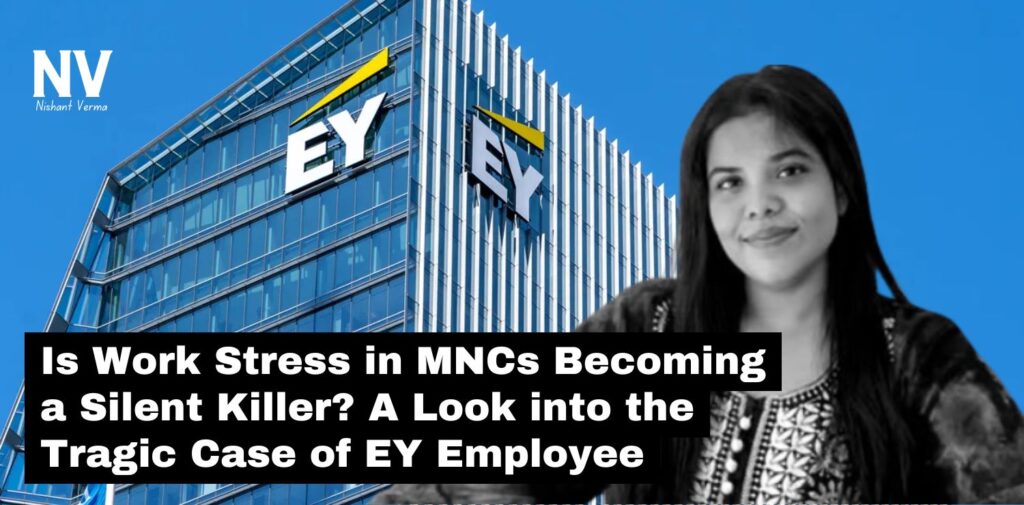The tragic death of 26-year-old Anna Sebastian Perayil, an EY employee in Pune, has sparked widespread discussion about the toxic work culture in multinational corporations (MNCs). Anna’s passing, attributed by her family to extreme work pressure, brings into focus the larger issue of stress-induced health problems in corporate environments.
The Tragic Story of EY Employee Anna Sebastian
Anna, a fresh Chartered Accountant, joined EY in March 2024 with high hopes for her career. However, just four months into her role, she tragically passed away on July 20, 2024. Her mother, Anita Augustine, penned a deeply emotional letter to the EY India Chairman, Rajiv Memani, accusing the company of pushing her daughter into extreme physical and emotional stress due to overwhelming work pressure.

According to the letter, Anna began experiencing sleeplessness, anxiety, and chest pain soon after starting her job. Despite visiting a doctor, who suggested stress as the primary cause, Anna continued working, driven by her desire to succeed. Her mother detailed the relentless pressure, with Anna’s manager dismissing her concerns about long hours and last-minute tasks. The company’s lack of empathy was highlighted when none of her colleagues attended her funeral, further emphasizing the lack of support she faced in her final months.
The Toxic Culture in MNCs
The letter has resonated widely on social media, where it has reignited the debate on corporate work culture. Over the years, many MNCs have been accused of promoting a “hustle culture” that glorifies overwork. Despite global conversations around mental health, many corporations, particularly in India, still expect employees to sacrifice personal well-being for productivity. Anna’s case is a devastating reminder that unchecked work pressure can have fatal consequences.

This tragedy isn’t isolated. Research shows that many employees in high-pressure jobs report experiencing mental health issues, including anxiety, depression, and burnout. In Anna’s case, her desire to persevere through the toxic environment led her to ignore the signs of severe stress. Many young professionals, especially those new to the workforce, feel pressured to conform to these demanding expectations, thinking it’s the only way to prove their worth.
Why is Work Stress a Growing Problem?
Work stress is increasingly becoming a silent killer in the corporate world. Studies reveal that long working hours, excessive workloads, and a lack of work-life balance are contributing factors. Employees are often asked to meet tight deadlines, even at the cost of their health. In Anna’s case, her work schedule included last-minute meetings and assignments that left her physically and mentally drained. This kind of pressure not only affects mental health but can lead to physical health complications like cardiovascular issues, as seen with Anna’s repeated chest pains.
This kind of environment is not unique to EY. Many MNCs have similar practices, where employee well-being is compromised in the race to meet targets. The high turnover rates in such companies are a direct result of this, as people eventually burn out and leave.
The Corporate Response and Accountability
After the letter went viral, EY issued a statement expressing its sadness over Anna’s death but refrained from addressing the specific allegations of a toxic work culture. The company’s response triggered even more outrage on social media, with many calling out the superficial nature of corporate empathy in such situations. Despite offering counseling services and wellness programs, employees often feel that these initiatives are performative rather than genuinely helpful.
Anna’s mother called for a change in corporate work environments, urging leaders to reflect on how they manage and support employees. In her letter, she criticized the “glorification of overwork” and demanded that companies like EY stop treating workers like mere cogs in a machine. This sentiment is shared by many in the workforce, as evidenced by the massive reaction to Anna’s story.
The Way Forward: How MNCs Can Improve Work-Life Balance
Anna’s case should be a wake-up call for MNCs to reevaluate their approach to employee well-being. While it’s true that high-pressure jobs will always exist, companies must take active steps to ensure that work does not come at the cost of mental or physical health. Key steps could include:
Promoting Work-Life Balance: MNCs need to create a culture where employees are encouraged to maintain a balance between their personal and professional lives. Offering flexible working hours, encouraging time off, and discouraging after-hours communication can help reduce stress.
Monitoring Workloads: Managers should be trained to recognize the signs of overwork and burnout in their teams. Assigning reasonable workloads and realistic deadlines are crucial in preventing unnecessary stress.

Prioritizing Mental Health: Companies should invest in more than just token wellness programs. Offering mental health days, counseling services, and stress management workshops can create a supportive environment.
Encouraging Open Dialogue: Employees should feel comfortable voicing their concerns without fear of repercussions. Creating an environment where employees can discuss their struggles openly will help companies address issues before they escalate.
Conclusion: The Cost of Ignoring Work Stress
Anna Sebastian Perayil’s death is a stark reminder of the dangers of ignoring work stress in MNCs. As companies push for higher productivity, they must also consider the human cost. The tragic loss of a young life due to work-induced stress serves as a powerful message that no job is worth sacrificing mental and physical health. It’s time for MNCs to stop glorifying overwork and start prioritizing employee well-being, lest more lives are lost to the pressures of the corporate world.
Anna’s story should be the catalyst for meaningful change, not just at EY but across the corporate landscape, especially in India, where such issues are often overlooked.




